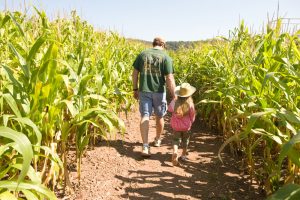Bulletin #4800, Maine Farms: Life and Business in Balance
By Leslie Forstadt, Human Development Specialist, University of Maine Cooperative Extension
For information about UMaine Extension programs and resources, visit extension.umaine.edu.
Find more of our publications and books at extension.umaine.edu/publications/.
This publication series, Maine Farms: Life and Business in Balance, provides ideas for you to consider about the human and relational skills of farming including how to have farm team meetings, stress management, defining roles, and talking about life and business balance, or what some people think of as “work/life integration.” Whatever it means to you, this series is intended to provide you with useful ideas to consider.
Titles include:
- Bulletin #4801, Why Gratitude Matters
Learn how the simplicity of thanks and gratitude can benefit employees and family members. - Bulletin #4802, Successful Farm Team Meetings
Learn some logistics about why and how to have effective meetings with your farm team. - Bulletin #4803, Farm and Family—Finding Balance
Learn how considering your personal experience of balancing can benefit the farm family. - Bulletin #4804, Who Does What on the Farm? The Importance of Roles
Learn how to think about the roles and responsibilities of tasks on the farm and how delegating can help. - Bulletin #4805, Recognizing the Signs of Farmer Stress
Learn to understand that how you’re doing matters and the importance of checking in with the people you work with. - Bulletin #4806, Active Listening to Improve On-Farm Communication
Learn how to listen well so everyone on the team has a chance to speak and be heard. - Bulletin #4807, Farm Coaching to Support Farm-Team Communication
Learn how the benefits of farm coaching can help you to meet your goals. - Bulletin #4808, Appreciation Feedback
Learn new skills on how to give appreciation feedback to motivate your team.

There are many pieces to put into place to support a farm’s success. According to the most recent agricultural census, the number of Maine farms decreased from over 8,000 in the 2012 census to 7,600 in 20171, a loss of 7%. On the farm, the average age of the principal operator remained steady at 57 years old, and almost half (48%) of Maine’s farmers reported farming as their primary occupation. Among Maine farms, 30% of principal operators are women, corresponding with a rise in the total number of women principal producers from 2,381 to 4,265. In 2017, the census collected information about up to four primary producers, and the data reflect the number of producers across all age groups increased, but did so at varying rates. For example, the percentage of farmers under 44 increased by 9.6% compared to the 30% increase in farmers who are 65 and older.2
At each life stage, farmers, farm families, and farm teams have unique needs. These needs will influence decisions about farming practices, child-rearing, business growth, and succession planning.
There are rewards and stressors at each stage of each person’s life and in the life of the farm. This series of publications was designed with the people of Maine’s farming industry in mind. Interpersonal and intrapersonal needs are addressed, as readers are encouraged to think about, discuss, and access resources to support the personal experiences and relationships in farming. We hope that these fact sheets will help foster the personal sustainability of farmers by strengthening communication and social connection.
1 USDA/NASS 2018 State Agriculture Overview, Maine
2 Maine Farmland Trust article: Results of 2017 Ag Census Concerning for Maine Farms and Farmland
Thank you to Jason Lilley, Extension Associate Professor, University of Maine Cooperative Extension for review of this publication.
Information in this publication is provided purely for educational purposes. No responsibility is assumed for any problems associated with the use of products or services mentioned. No endorsement of products or companies is intended, nor is criticism of unnamed products or companies implied.
Information in this publication is provided purely for educational purposes. No responsibility is assumed for any problems associated with the use of products or services mentioned. No endorsement of products or companies is intended, nor is criticism of unnamed products or companies implied.
© 2014, 2019, 2024
Call 800.287.0274 (in Maine), or 207.581.3188, for information on publications and program offerings from University of Maine Cooperative Extension, or visit extension.umaine.edu.
In complying with the letter and spirit of applicable laws and pursuing its own goals of diversity, the University of Maine System does not discriminate on the grounds of race, color, religion, sex, sexual orientation, transgender status, gender, gender identity or expression, ethnicity, national origin, citizenship status, familial status, ancestry, age, disability physical or mental, genetic information, or veterans or military status in employment, education, and all other programs and activities. The University provides reasonable accommodations to qualified individuals with disabilities upon request. The following person has been designated to handle inquiries regarding non-discrimination policies: Director of Equal Opportunity, 5713 Chadbourne Hall, Room 412, University of Maine, Orono, ME 04469-5713, 207.581.1226, TTY 711 (Maine Relay System).

